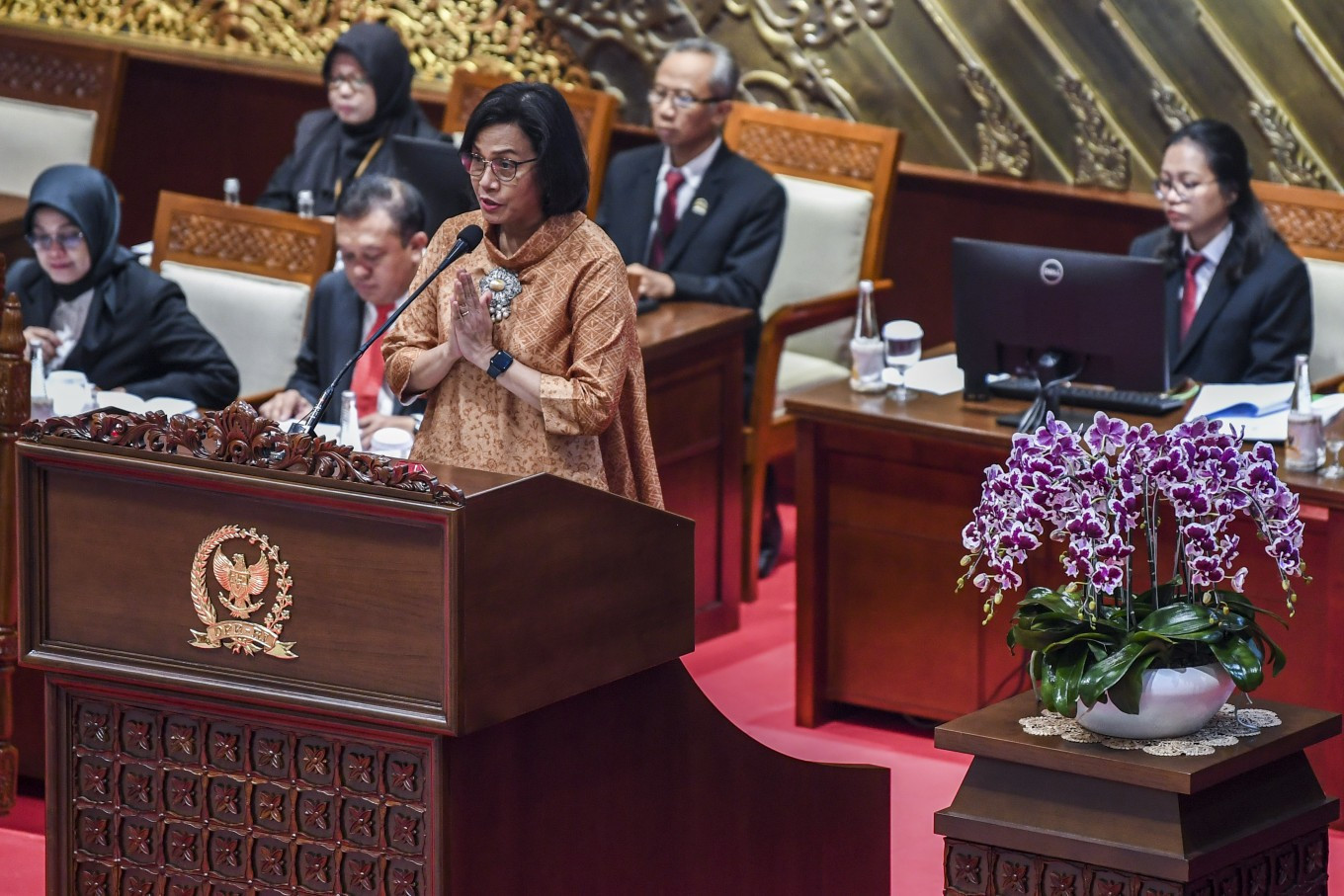News
Government’s dubious response to slowing economy
Tenggara Strategics July 19, 2025 Finance Minister Sri Mulyani Indrawati speaks about fiscal policy on May 20, 2024 at a House of Representatives plenary session in Jakarta. (Antara/Galih Pradipta)
Finance Minister Sri Mulyani Indrawati speaks about fiscal policy on May 20, 2024 at a House of Representatives plenary session in Jakarta. (Antara/Galih Pradipta)
Indonesia’s economy is clearly losing momentum, with key indicators pointing to a broader slowdown. Economic growth dropped to 4.87 percent in the first half of 2025, down from 5.08 percent in the same period last year. In response, the government has introduced a series of stimulus packages to boost household spending but the measures may fall short, as both investment and business activity continue to weaken.
The government initially targeted 5.2 percent growth for this year, but has since revised the projection down to a range of 4.7 to 5 percent. The Finance Ministry attributes the slowdown in part to weaker global economic conditions. The World Bank expects global growth to fall to 2.3 percent in 2025, from 2.8 percent in the previous year.
But external factors tell only part of the story. Domestic challenges are compounding the slowdown. A drive for budgetary efficiency led to a 1.4 percent contraction in government spending in the first quarter, while investment growth slowed to just 2.1 percent, down significantly from 3.8 percent in the same period last year. This weakening investment climate is also reflected in the manufacturing Purchasing Managers’ Index (PMI), which has remained in contraction territory for three consecutive months.
Faced with these headwinds, the government now expects a wider fiscal deficit of 2.78 percent of GDP, up from the initial target of 2.53 percent, due to lower-than-expected revenue collection. As of the first half of 2025, state revenue reached only 40 percent of the annual target, a decline from 47.1 percent in the same period last year. Tax revenue alone fell 7.5 percent year-on-year.
However, the core concern is not the widening deficit itself, but rather the quality and productivity of government spending. The Finance Ministry had initially blocked Rp 134.9 trillion (US$8.4 billion) in budget allocations as part of its efficiency drive but has since released those funds to finance President Prabowo Subianto’s flagship programs.
This reversal raises questions about the effectiveness of these spending priorities. Among the programs under scrutiny are the construction of three million homes, the “red-and-white” village cooperation initiative and the free nutritious meal program. The free meals program’s budget has ballooned from Rp 71 trillion to Rp 171 trillion this year, despite persistent implementation challenges and difficulties in measuring its impact.
The economic slowdown is also mirrored in the financial markets. The stock market has seen a significant sell-off by foreign investors, with net foreign outflows reaching Rp 8.31 trillion on the Indonesia Stock Exchange (IDX) in the month to July 7. Since Prabowo’s inauguration on Oct. 20, 2024, stock returns have fallen by 10 percent, worse than the 3 percent decline during the same period in Joko Widodo’s first term.
In contrast, the government bond market is experiencing a rally, with foreign investors shifting their interest from equities to debt. By June 2025, net foreign purchases of government bonds reached Rp 40.81 trillion. This demand has pushed yields lower, making borrowing cheaper for the government. Yields on 10-year government securities have dropped by 34 basis points year-to-date, from 7.2 percent to 6.6 percent, the lowest level since September 2024.
Another driver behind the falling yields is the growing role of Bank Indonesia (BI) as a major holder of government debt. Since March 2021, BI has overtaken foreign investors as the largest holder of sovereign bonds. In 2019, BI held just 5 percent of government bonds; by July 8, 2025, that figure had risen to 24.14 percent, with total holdings valued at Rp 1,528 trillion.
In recent months, BI has also provided fiscal support to the government. It agreed to a debt-switching arrangement involving Rp 100 trillion in maturing bonds and plans to inject another Rp 130 trillion to help finance the three-million-homes program, initiated by Prabowo’s brother, Hashim Djojohadikusumo. While such actions may offer temporary relief, prolonged central bank intervention risks undermining its independence and credibility.
Lower bond yields may be good news for the government’s financing costs, but they do not signal overall economic strength. The key to long-term fiscal health lies in productive and effective spending, not short-term, consumption-driven measures. With 20 percent of government expenditure already going toward interest payments, policymakers must ensure that public spending unlocks future growth rather than compromising fiscal sustainability.

